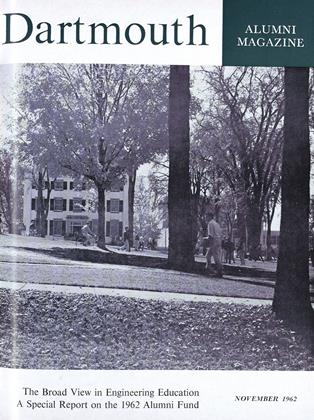By RichardHovey. Introduction by Carlos Baker '32.Hanover: Dartmouth Publications, 1962.61 pp. $2.75.
The impressive discovery I made in recent years about Hovey is that he had a literary and a Paris friendship with Mallarme. This one learns from Allan Macdonald's excellent book. My estimation of Hovey went up one thousand per cent. Here is a strange and exceptional character about whom the last word has probably not yet "been written.
Perhaps it would astound Hovey, were he to come back to visit the world, to learn that he is chiefly, if not only, known by those songs of his sung by Dartmouth men throughout the world. Perhaps it is the happiest fate he could have imagined. Our voices lift and many voices swell and rejoice in his communicative college poems, as good as any we have in America. As a group belonging to one college they are unexcelled.
And this despite the universal embarrassment of men of sensitivity in the make of the line "In their muscles and their brains," so atrocious as to be a subversion to the comic. Thousands of men have sung this line lustily throughout the decades since I was an undergraduate without the slightest apparent dismay, which gives one, I suppose, a final confidence in the human race, which does not have for the most part to make fine distinctions. I, too, rejoice in this poem, and overcome my aversion to the above line in the swell and reach of the words of the poem, its incantatory effect. And his other rousing, youthful songs. I responded to these songs as an undergraduate and I respond to them still, with equal abandonment.
Of the granite-stuffed muscles scholars have recently said it should in fact, according to the manuscript, be "muscle," but I doubt even if it were so established the great body of the alumni could be re-educated to sing it another way.
Here is Hovey, his intellectual mystery hidden in a grace of song, not a sign or hint in this book of Mallarmé. Here is our man, our elusive Dartmouthian, in his wonderful book of lyrics and songs, imperishable while the College lives, chivalric, full of hearty male response to nature, a marvelous book for even those outside the Dartmouth community to read and to love; a book exceptionally well made, whose design by Ray Nash Hovey would have loved and whose introduction by Carlos Baker he must have conceded as just.
The book is a worthy successor to Edwin Osgood Grover's edition of 1924 and to Francis Lane Childs' edition of 1938. The curious may wish to collate the contents of the three volumes. The present book reprints the sixteen poems, used by Childs. Osgood presented forty-two. Scholars may be instructed in the staying power and use of poetry in studying the deletions.
 View Full Issue
View Full Issue
More From This Issue
RICHARD EBERHART '26
-
 Letters to the Editor
Letters to the EditorLetters to the Editor
OCTOBER 1972 -
 Letters to the Editor
Letters to the EditorLetters
JANUARY/FEBRUARY 1984 -
 Class Notes
Class Notes1926
June 1954 By HERBERT H. HARWOOD, ANDREW J. O'CONNOR, Richard Eberhart '26 -
 Feature
FeatureThe Poet as Teacher The Poet as Teacher
November 1956 By RICHARD EBERHART '26 -
 Books
BooksSELECTED POEMS.
MAY 1966 By RICHARD EBERHART '26 -
 Books
BooksTalking to Oneself
April 1981 By Richard Eberhart '26
Books
-
 Books
BooksFaculty Publications
-
 Books
BooksInside the Enigma
JANUARY/FEBRUARY 1984 By Charles B. Mclane '41 -
 Books
BooksBriefly Noted
MAY 1969 By J.H. -
 Books
BooksBLACK ANGELS OF ATHOS
January 1935 By John Barker Stearns -
 Books
BooksREVOLUTION IN SOUND: A BIOGRAPHY OF THE RECORDING INDUSTRY.
October 1974 By RICHARD HOLBROOK '31 -
 Books
BooksTHE MONETARY AND BANKING SYSTEM
October 1950 By William A. Carter '20







